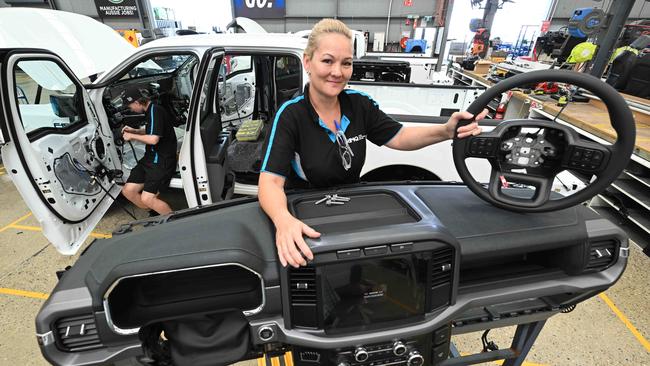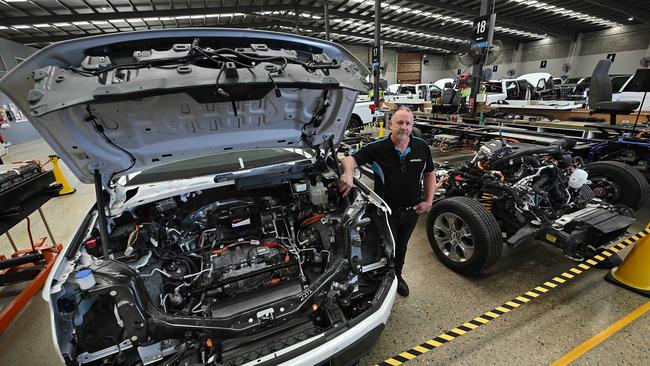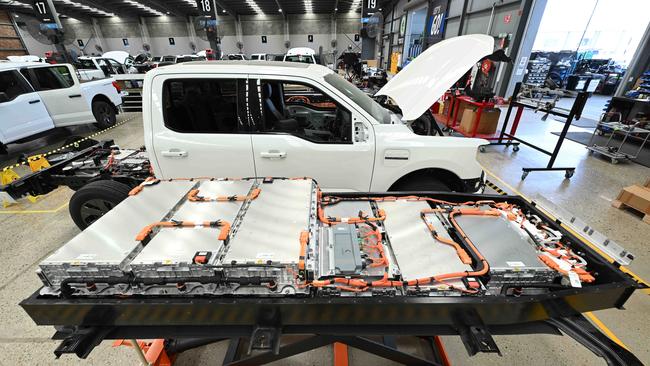Lightning rod for homemade electric utilisation
Ten years after the demise of Australia’s car industry, Eddie Kocwa has an assembly line to convert the US’s most popular electric ute for use in Australia and the Pacific.

Ten years after the demise of Australia’s car industry, Brisbane biochemist Eddie Kocwa has built an assembly line to convert the US’s most popular electric ute for use throughout Australia and the Pacific.
Within four months of beginning production, BossCap has converted 150 Ford F-150 Lightnings from left to right-hand drive in order to meet the growing need of businesses and their environmental and climate targets, with deals already struck with the UN, airports and mining companies.
BossCap chief executive Mr Kocwa said they were unlocking technology that would otherwise have been a decade away. “We’re trying to help companies reduce their emissions,” he said. “We know that they’re on the clock, they’ve got targets to hit by 2030 and 2050. So we’re bringing vehicles to this market, that’s our goal.”
BossCap’s factory in the outer northern Brisbane suburb of Brendale currently “remanufactures” three vehicles a day but has the potential to ramp up production to 150. The car has been tested to make sure it can adapt to the harshest of Australian conditions, having done laps around Holden’s historic Lang Lang test track in Victoria and Lakeside Park in Brisbane’s Kurwongbah.
Not only is BossCap reigniting Australia’s vehicle manufacturing industry, it is offering an alternative to Chinese-built electric vehicles as regulators become increasingly wary about the use of foreign technology in cars, with bans currently being proposed in the US.

The business reported turnover of $100m last year and prides itself on being wholly Australian-owned and employing nearly 100 people. Almost the entirety of its supply chain is onshore, which protects it against the turbulence encountered by many industries during the pandemic.
“Creating jobs, creating industry and developing capability (is) important to us because there is not much left in Australia,” Mr Kocwa said. “We’ve seen what happens when supply chains get compromised – everyone rushes and panics. We need to have capability in Australia.

“We really enforce an Australia policy across the whole business, even in cases where it costs more, because we will have that resilience and dependability.”
The local element also allows the business to respond to the needs of different industries and build each vehicle to specification. Construction and renewable energy development business MPC Kinetic has six vehicles in play as it looks to replace its diesel fleet.
BossCap has also partnered with the UN via a local dealer in Samoa, with the vehicles able to act as back-up generators for homes connected to the island nation’s irregular power grid. “These vehicles have a tremendous onboard power supply,” Mr Kocwa said. “That’s the added benefit to EV; aside from (them being) cleaner and greener, having mobile power in remote locations or off-grid is something I don’t think Australia fully understands yet; once we do, it’s a game-changer.”

Mr Kocwa and the company’s co-founders are in discussions with other vehicle manufacturers.
Brisbane Airport is trialling two of the F-150s on the tarmac as part of its ambition to operate carbon naturally by 2025. Airport fleet and mechanical manager Greg Burke said it took six months to develop specifications needed for the utes to operate as airside safety vehicles. “Due to their operation in a live runway environment, any shift in technology comes with unique challenges to overcome,” he said. “But as a sustainability leader, it’s something we are committed to do. So far the Lightning is ticking all our boxes.”






To join the conversation, please log in. Don't have an account? Register
Join the conversation, you are commenting as Logout